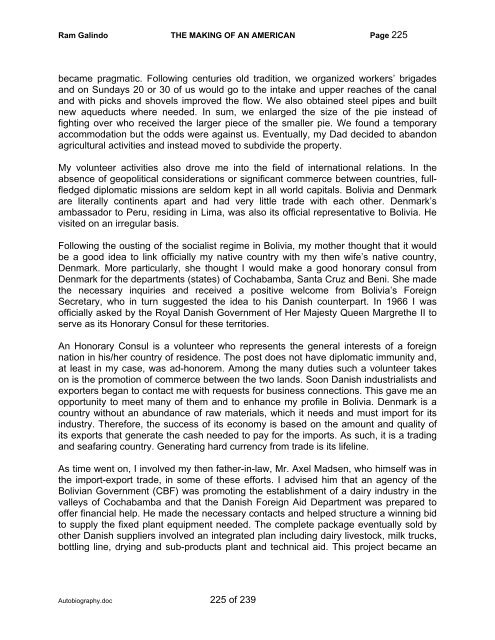Autobiography - The Galindo Group
Autobiography - The Galindo Group
Autobiography - The Galindo Group
You also want an ePaper? Increase the reach of your titles
YUMPU automatically turns print PDFs into web optimized ePapers that Google loves.
Ram <strong>Galindo</strong> THE MAKING OF AN AMERICAN Page 225<br />
became pragmatic. Following centuries old tradition, we organized workers’ brigades<br />
and on Sundays 20 or 30 of us would go to the intake and upper reaches of the canal<br />
and with picks and shovels improved the flow. We also obtained steel pipes and built<br />
new aqueducts where needed. In sum, we enlarged the size of the pie instead of<br />
fighting over who received the larger piece of the smaller pie. We found a temporary<br />
accommodation but the odds were against us. Eventually, my Dad decided to abandon<br />
agricultural activities and instead moved to subdivide the property.<br />
My volunteer activities also drove me into the field of international relations. In the<br />
absence of geopolitical considerations or significant commerce between countries, fullfledged<br />
diplomatic missions are seldom kept in all world capitals. Bolivia and Denmark<br />
are literally continents apart and had very little trade with each other. Denmark’s<br />
ambassador to Peru, residing in Lima, was also its official representative to Bolivia. He<br />
visited on an irregular basis.<br />
Following the ousting of the socialist regime in Bolivia, my mother thought that it would<br />
be a good idea to link officially my native country with my then wife’s native country,<br />
Denmark. More particularly, she thought I would make a good honorary consul from<br />
Denmark for the departments (states) of Cochabamba, Santa Cruz and Beni. She made<br />
the necessary inquiries and received a positive welcome from Bolivia’s Foreign<br />
Secretary, who in turn suggested the idea to his Danish counterpart. In 1966 I was<br />
officially asked by the Royal Danish Government of Her Majesty Queen Margrethe II to<br />
serve as its Honorary Consul for these territories.<br />
An Honorary Consul is a volunteer who represents the general interests of a foreign<br />
nation in his/her country of residence. <strong>The</strong> post does not have diplomatic immunity and,<br />
at least in my case, was ad-honorem. Among the many duties such a volunteer takes<br />
on is the promotion of commerce between the two lands. Soon Danish industrialists and<br />
exporters began to contact me with requests for business connections. This gave me an<br />
opportunity to meet many of them and to enhance my profile in Bolivia. Denmark is a<br />
country without an abundance of raw materials, which it needs and must import for its<br />
industry. <strong>The</strong>refore, the success of its economy is based on the amount and quality of<br />
its exports that generate the cash needed to pay for the imports. As such, it is a trading<br />
and seafaring country. Generating hard currency from trade is its lifeline.<br />
As time went on, I involved my then father-in-law, Mr. Axel Madsen, who himself was in<br />
the import-export trade, in some of these efforts. I advised him that an agency of the<br />
Bolivian Government (CBF) was promoting the establishment of a dairy industry in the<br />
valleys of Cochabamba and that the Danish Foreign Aid Department was prepared to<br />
offer financial help. He made the necessary contacts and helped structure a winning bid<br />
to supply the fixed plant equipment needed. <strong>The</strong> complete package eventually sold by<br />
other Danish suppliers involved an integrated plan including dairy livestock, milk trucks,<br />
bottling line, drying and sub-products plant and technical aid. This project became an<br />
<strong>Autobiography</strong>.doc 225 of 239


